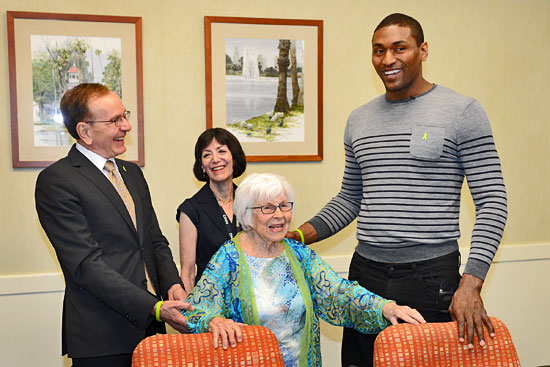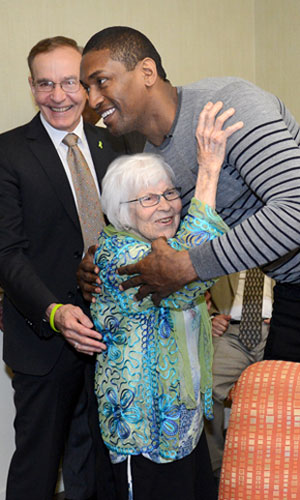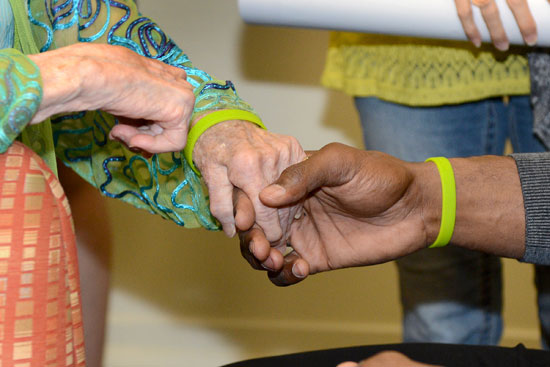Score two for mental health
May 14, 2013

Mutual fans: Stella March, center, with Laker star Metta World Peace. At left, county mental health director Marvin Southard and chief deputy Robin Kay. Photo/Los Angeles County
“How’s Kobe doing?”
The question came from 97-year-old Stella March, a stalwart Lakers fan for decades. And it was directed at someone she thought would know—Kobe Bryant’s teammate, Metta World Peace.
“He tried to fight through it, but he couldn’t,” Metta said of Bryant and the Achilles tendon he tore on the eve of this year’s NBA playoffs. “He’s doing better now,” he assured March.
“I felt badly for him,” she said softly.
Then March turned the conversation toward Metta—and her observations had nothing to do with hoops. “What you’re doing for the kids, it’s very meaningful,” she told him. As they talked, they held hands.
From outward appearances, these two—the tiny white-haired woman with the walker and the towering player with the muscular arms—might seem like an odd pairing for a meeting of the Board of Supervisors. But as both would be quick to tell you, you can’t judge what’s inside from the outside. For they share a mission that transcends their cultural and generational divide; both are committed to destigmatizing mental health problems and treatment. And in that respect, both are very much on their game.
March and MWP, as the former Ron Artest likes to be called, were honored Tuesday by the board to kick-off “Mental Health Awareness Month.”
March is widely recognized as one of the nation’s preeminent advocates for families whose lives have been touched by mental illness, a crusade she began in the late 1970s after her son, a UCLA student, was diagnosed with schizophrenia. Among other things, her efforts led to greater government and pharmaceutical research, ultimately helping to produce a new generation of medications. She also was the driving force behind building the National Alliance on Mental Illness and initiating its “StigmaBusters” program to combat inaccurate representations of mental illness in film, television, print and other media.
In those early years, she says, mental health treatment and research was so bad that many serious sufferers “were wandering around on the streets with nowhere to go. They were shunned and stigmatized as dirty street people.” With her organization’s help and support, she says, many of the severely afflicted “learned the basic skill of telling people how they recovered. Each one had a different story of recovery. It was fantastic.”
Metta World Peace understands the power of that message. Ever since he made headlines by thanking his therapist on network television after the Laker’s 7th-game championship victory in 2010, the once-troubled player has openly talked about his counseling for anger and family issues. In December of that year, he teamed up with the Los Angeles County Department of Mental Health to produce a public service announcement aimed at encouraging young people to seek help. “Talk to somebody about it,” he says in the PSA. “I did. Take the first steps. Be a champion.”
Since then, he’s also made his pitch during high school assemblies here and across the country and has created a website called Limelight that promotes mental health treatment. A new public service announcement campaign between Metta World Peace and the county—called “Talk it Out”—was launched earlier this month and will continue throughout May.
Before their Tuesday appearance before the Board of Supervisors, March, a fan of MWP’s moves on and off the court, asked to meet him in a small conference room behind the board’s dais, where he was signing posters for the new campaign. Helped into the room by her daughter, Joella, and officials from the mental health department, March was greeted by the 6-foot-7 player with an embrace, as though she were the star. He then took a seat beside her so she wouldn’t have to strain looking up at him.
“Thank you for what you’ve done to help,” she told him. “We’ve got to keep advocating for people.”
She needn’t worry. As Metta World Peace told the audience in the board’s hearing room: “This is a lifetime work.”
Posted 5/14/13














 405 bridge work causes a stink
405 bridge work causes a stink
